“I didn’t really do anything out of the ordinary,” said Jimmy Anderson about an over that featured one of the finest clean-bowleds you’re ever likely to see, then another one that may or may not have been better, plus an LBW shout that could legitimately have been given sandwiched in between. It’s safe to say Jimmy has his own version of ‘ordinary’ these days.
You could forgive Anderson for going all Dr Manhattan and feeling like he doesn’t have much in common with humanity any more. Maybe he’ll retire after this series and head to Mars on his tod to build a whole new world just for himself.
That possibility is still some way off. For now we have more pressing questions, like which of those two clean bowleds was the better?
The wickets
Shubman Gill was clean bowled by a reverse swinging delivery for 50.
Ajinkya Rahane was clean bowled by a reverse swinging delivery for 0.
They were really, really similar dismissals. Similar enough that someone stuck them alongside each other in a GIF.
There were two balls in between: one that didn’t swing, which Rahane left; and then one that hit him on the pad that wasn’t given LBW – but which could have been.
The criteria
As everyone knows, these are the five elements you need to look at in these situations.
- Swing
- The stroke played (and beaten)
- Stump cartwheeliness
- The batsman’s reaction
- The context
All of these things are important.
Let’s not make it too complicated though. Let’s take each element in turn and decide whether the Gill wicket or the Rahane wicket was superior and then tot it all up at the end.
Swing
Simple one this. How much did the ball swing? More is obviously better.
Except it’s not a simple one. It’s not a simple one at all.
Because this is the Gill one…
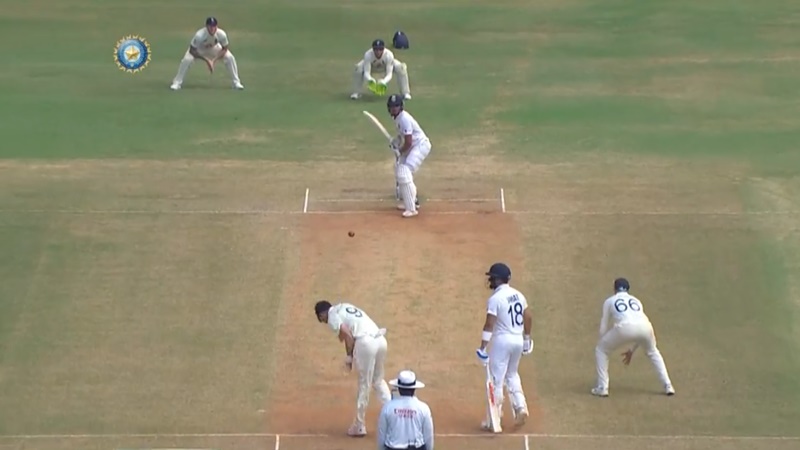
… and this is the Rahane one.
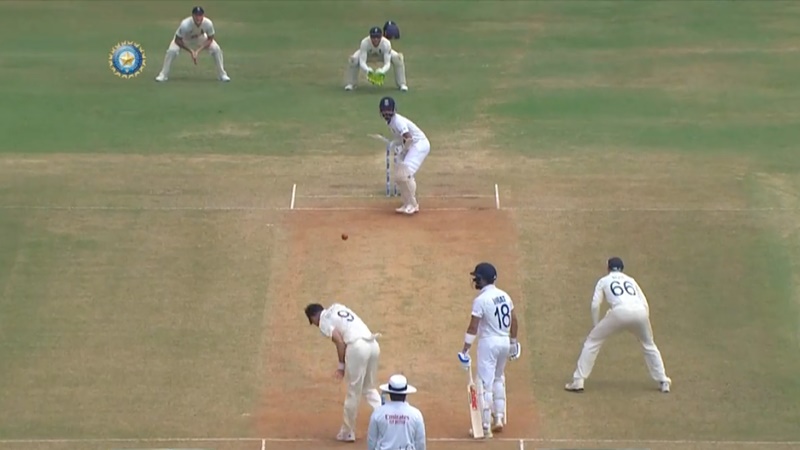
You could probably get Hawkeye to rule on this one, but we were flicking between two tabs in our browser trying to weigh this up and went slightly mad.
We’ve concluded this is not a hair worth splitting.
Verdict: Draw
The stroke played (and beaten)
A wicket is not all about what the bowler does. A lot of it is about what the batsman does – or, more accurately, fails to do.
‘Bowled’ is the best dismissal because it’s the most unequivocal. That isn’t to say that all bowleds are equal though.
If the batsman edges the ball onto the stumps or is bowled off the pad, that really takes the gloss off.
Similarly, if he has a big yahoo and misses, that’s less good than when he attempts to do nothing more than block the ball and yet completely fails to make contact.
Both of these were fail-to-blocks, so this is another really hard one to call.
This is the shot Gill played…
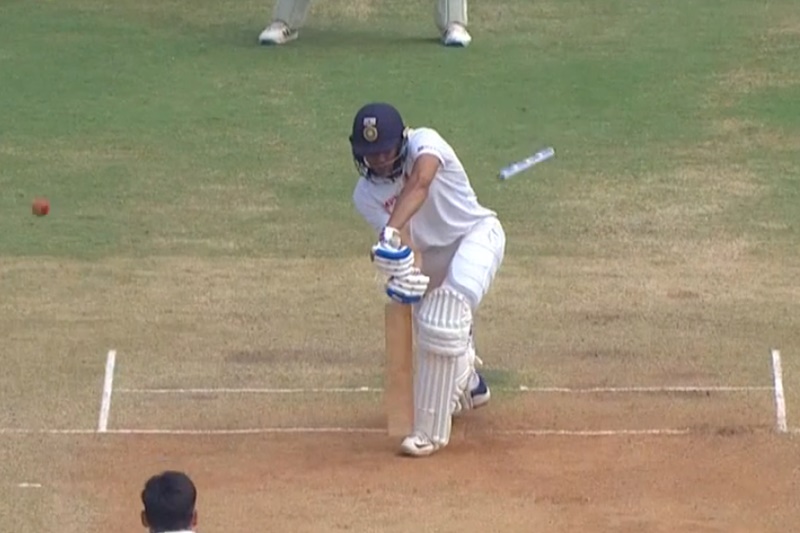
… and this is the shot Rahane played.
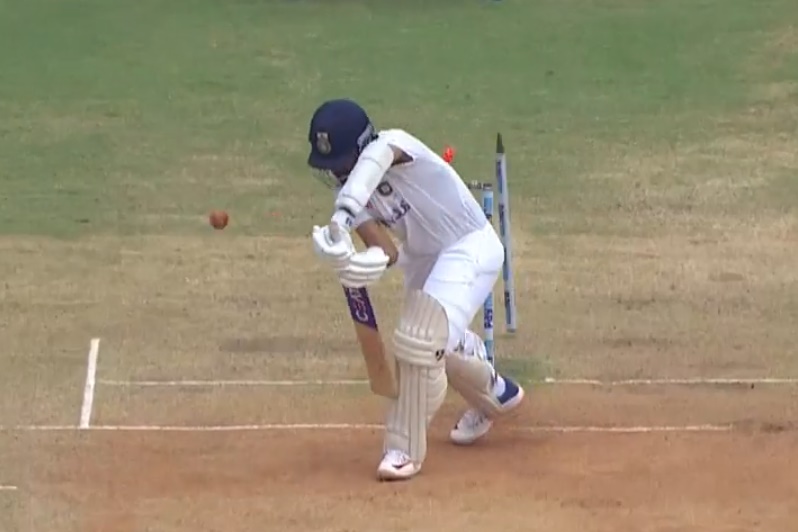
Given the swing, you could probably argue that Rahane is actually the one presenting the full face of the bat.
However, from the viewer’s perspective, there’s something immensely satisfying about Gill’s position, pointing straight at the camera with the stumps spread behind him. That really seems to emphasise the brilliance of the delivery.
The bats of both Gill and Rahane actually came down slightly imperfectly before they reached those positions, but we swear the only nanosecond where it looked like the ball could possibly have avoided making contact with Gill’s bat was the nanosecond when it actually went past. It was almost like the ball had brought a bat-repelling forcefield with it.
Verdict: The Gill wicket
Stump cartwheeliness
This one’s very, very important. Everyone knows the more times a stump cartwheels, the better the dismissal.
Gill’s stump did two complete airborne revolutions before landing on its top. It then fell back towards the stumps, so that’s not quite two-and-a-half spins.
Rahane’s stump did two complete airborne revolutions before landing on its side.
Neither stump bounced and continued on its journey, which was a bit disappointing.
In complete contradiction of what we said at the start of this section, we’re actually going to give this one to the Rahane wicket because it nailed the landing. Even though it didn’t spin quite as much, it finished with a neat lie-down, so it gets points for execution.
Verdict: The Rahane wicket
The batsman’s reaction
Think of Mike Gatting’s “what have I just seen?” reaction to Shane Warne’s Ball of the Century or Virat Kohli’s face after he was bowled by Adil Rashid that time. The batsman’s reaction can really elevate a wicket to a new level.
This is another tricky one to call.
Gill went with “hold the pose” – which is a very excellent way of being out when it looks like you’ve played a perfectly sensible shot.
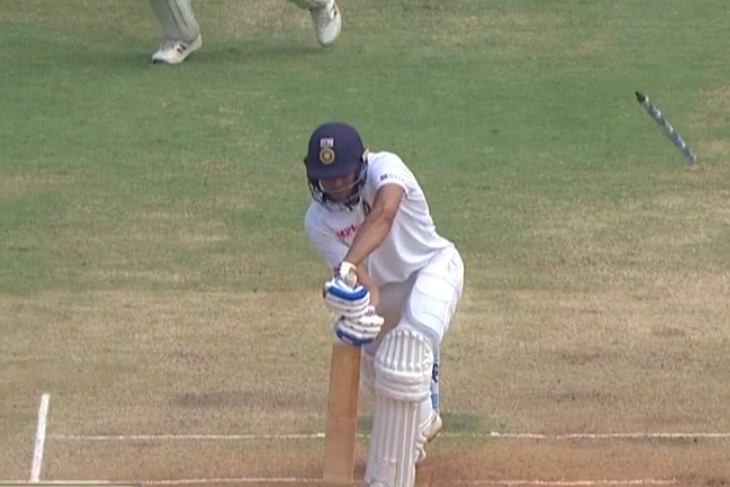
Rahane went the other way, plumping for, “was that my off stump flying out of the ground?”
This is perhaps even funnier, because what the hell else did he think that ball-on-stump sound might have been?
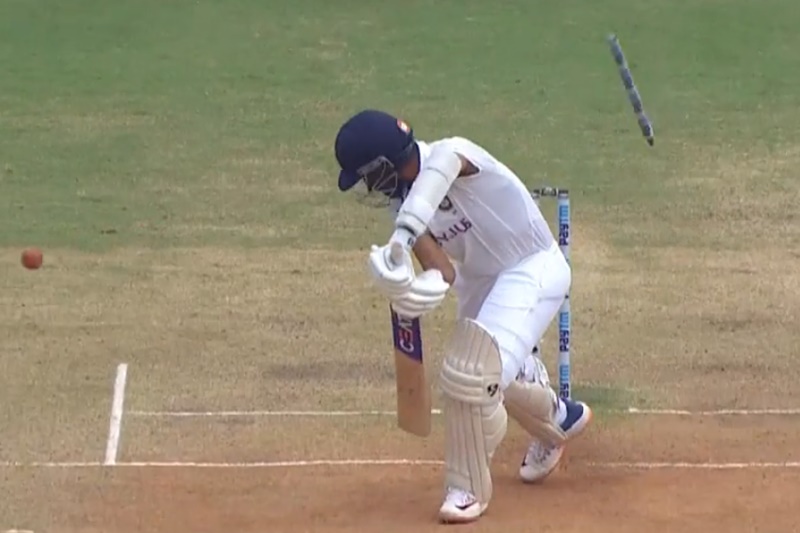
We feel like you can make a compelling case for both of these and they’re sufficiently different that it’s hard to weigh one against the other.
Verdict: Draw
The context
It was 92-2 for the Gill wicket and he had a half century to his name. Nothing much seemed to be happening in the game and then this happened.
That is quite dramatic.
However, we’re going to argue that context of Rahane’s wicket was better because Anderson had basically told him that he was going to try and bowl him out with the exact delivery he bowled him out with.
Firstly, Rahane had arrived at the crease because Anderson had bowled pretty much exactly that ball to Gill. Rahane knew this was a delivery that could definitely happen because it had literally just happened.
To doubly emphasise that there was danger afoot, Anderson then bowled a big in-swinger that hit Rahane on the pad and could, on another day, have been given out.
With his very next delivery, Anderson bowled Rahane.
Rahane couldn’t complain he didn’t see it coming. He knew what was coming, saw what was coming, tried to hit the ball and couldn’t.
Verdict: The Rahane wicket
Conclusion
James Anderson bowled Shubman Gill with an almost unimprovable delivery.
Three balls later, bowling to Ajinkya Rahane, he improved on it.
You can get this kind of stuff by email if you want. (The article, not the reverse-swinging clean bowleds).

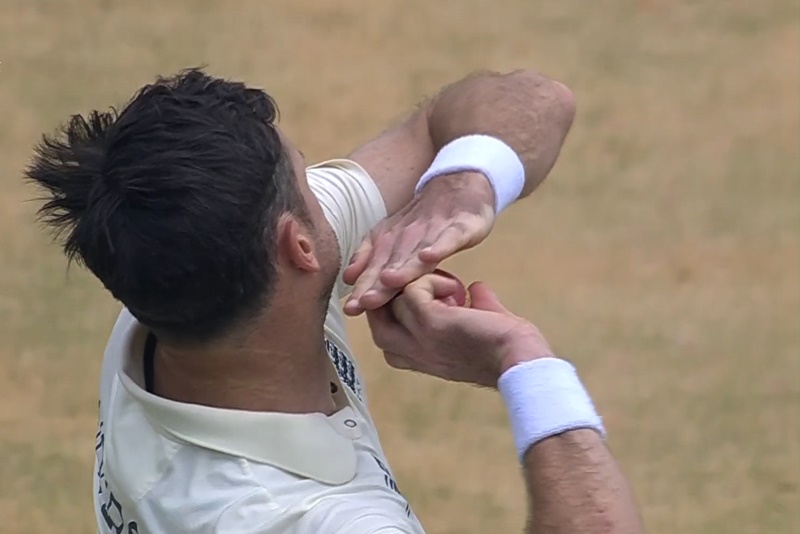

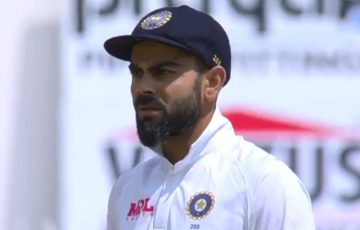
I watched this live, having sat through four and a bit days of context. I punched the air and almost spilled my Weetabix. Context is king.
I was also watching live and I have rarely felt that sense of cricketing excitement more when watching on TV.
Meanwhile Daisy slept through those vital deliveries and only stirred when, in her dozy words, “Pohli & Kant” were at the crease together.
No Weetabix in bed for me, Sam. Each to their own.
As for the central argument in this KC piece, I find it hard to distinguish between the quality of the two dismissals.
It was simply wonderful cricket.
This is the best article about cricket ever written.
We have, without a shadow of a doubt, produced worse.
Read into that statement what you will.
But cheers.
Great article, KC.
I reckon Jimmy will overtake Warne in the Test wickets tally. Combined with Anderson’s fitness levels and England’s policy of rotation I reckon he will be around for a few more years. If Anderson avoids injury he could overtake Warne in about 3 years. To me that sound achievable.
Doesn’t leaving a bail on count for something ? (Although I thought both of them had the leg bail still on)
They are literally using Zing bails.
This is shocking! This is the real cricket, ICC, with real bails and not the baseball game that they call T20.
It will probably actually be the BCCI that decide what bails they are going to use, etc.
Also Zing bails also add a bit more zest to the wickets that Anderson got (and Stokes, Leach, etc). It adds more to fact that their stumps have been totally shattered by the worlds best pace bowler.
I rather like the zing bails too. They enhance the ability of the third umpire to make marginal decisions on stumping and run outs.
Technology has taken away the joy of a cartwheeling middle pole, as the “stump cam” lessens or prevents that possibility. Zing bails add a little extra to the visual.
Traditionalism only gets us so far, Dave.
I was being extreme at that moment, Ged.
However, I still stand by the fact that Zing bails do not belong in Test matches.
I agree totally with you Ged, there is a sense of traditionalism and heritage using wooden stumps and bails, Zing bails do add that clarification for those that need it, it can also enhance the ability for the onfield umpire to make decisions as well, with the flashing for runouts, stumpings etc, which can be noticed without having to focus on them meaning the umpire can look at where the batter may be, in or out of the crease.
The stump camera is also a very quirky way to look at it as well, I don’t know if there is footage somewhere of Andersons two wickets from the perspective of the stump camera but I would guess it could look quite cool.
Not sure if you noticed it, but the one that got Rahane pitched slightly shorter & wider, and had to jag wider to reach the stumps.
I believe Anderson hit a rough patch with this one. Of course thats what he was aiming for but the jagging makes it more unpredictable for the batsman. So thats why Rahane looked back just to confirm that the ball really bent back so much after hitting the stumps
On that point, I think that they are surprised that it moved so much so late, seeing as both balls went around the outside of the bat meaning that both batters thought it would move in more maybe.
This only makes both the wickets even better.
In Anderson & Bess england have 2 bowlers who can take the pitch out of the equation when taking wickets
Bess just gets lucky wickets regardless of the pitch.
Looking at the England team for the second Test, is this the most important match that anyone has ever been ‘rested’ for?
I understand the reasoning, but can’t think of any past cricketing examples of where such a crucial game (if you think the World Test Championship is as important as, say, a World Cup) is an opportunity to give certain players a break.
I thought the same thing last night as well.
They need to play their best XI for this series and the rest don’t matter that much, also there can’t a much better sense of achievement than beating this current Indian team.
The rest don’t matter much? India at home, the World T20 and the Ashes in the rest of this year – not to mention there are two more Tests in short order after this one.
Jofra injured, Jimmy rested… looks like we’ll need two new quicks for the second test. Foakes looks certain to keep wicket, and that leaves two from three of Broad, Stone and… Woakes.
It’s finally happening, folks!